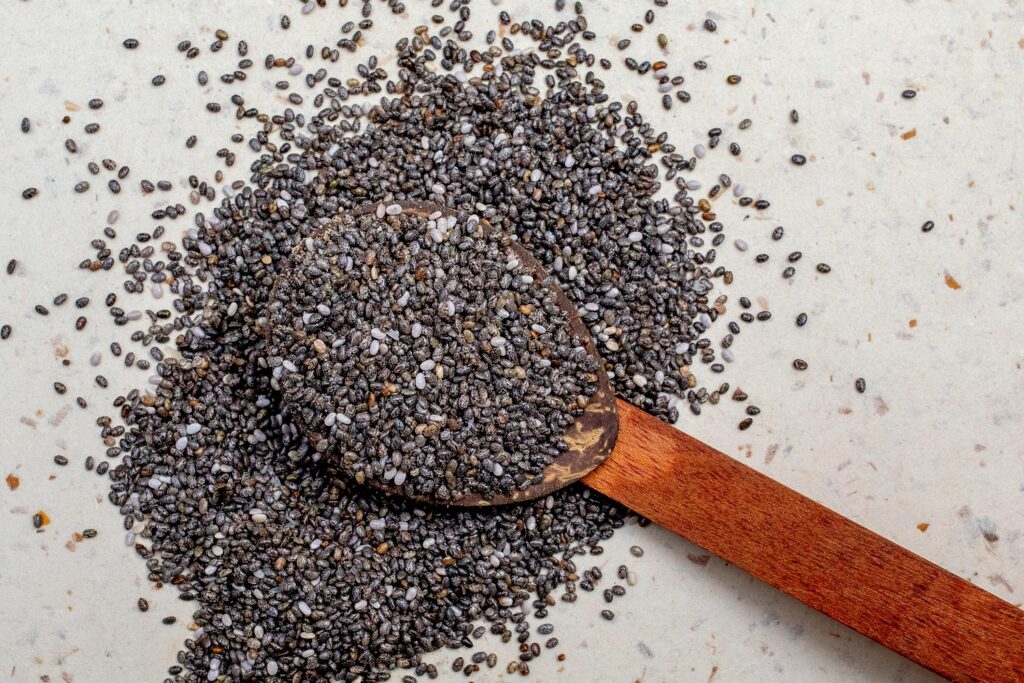There are many benefits of chia seeds. Highly nutritious, small chia seeds are rich in carbohydrates, protein, fiber, antioxidant substances, and omega-3 as well as fatty acids. You can easily add chia seeds to a variety of foods to give them a nutritional boost, whether you’re adding them to cooked recipes or using them as a topping for cereals or smoothies. In this blog , I am going to tell you about all things you need to know about chia seeds.
what are chia seeds?
Tiny black or white seeds called chia seeds are produced from the Salvia hispanica plant, a member of the mint family. For more than 5,000 years, people have included these tiny seeds in their meals. The inhabitants of Mexico and Maya people relied heavily on chia seeds. Chia is now grown for commercial purposes in a number of nations, including the US, Mexico, Guatemala, Peru, and Australia.
Benefits of chia seeds:
Chia seeds may promote a variety of health advantages. Among them:
Lowering blood pressure
Decreasing the levels of cholesterol
Improve bone and skin health
Promoting the health of the digestive system
Lessening anxiety and depression
Helps to remain hydrated
Lowering inflammation, controlling diabetes, preventing chronic disease, and assisting with weight management.
When consumed, chia seeds can reduce hunger and calorie intake.
Chia Seeds: Nutrient-dense.
Omega-3 fatty acids, dietary fiber, protein, antimicrobial agents, and other nutrients like calcium, magnesium, and phosphorus that are good for your health can all be found in chia seeds.
1. The antioxidants:
Tocopherols, phytosterols and polyphenolic chemicals are among the many antioxidants found in chia seeds. Free radicals can accumulate in the body and cause cell damage and disease, so antioxidants are essential for defending the body against their effects. Because of their high antioxidant content, chia seeds may offer protection against diabetes, cardiovascular illness, tumors, inflammation and cognitive impairment illness.
2. Fatty acids with omega-3:
Omega-3 fatty acids, particularly alpha-linolenic acid (ALA), are abundant in chia seeds. Chia seeds are a great plant-based source of ALA, an important fatty acid that may be found in just two tablespoons. Omega-3 fatty acids are essential for heart health, inflammation reduction, and cognitive function. The nutritional profile of chia seeds is further enhanced by the presence of protein, fiber, and antioxidants. It’s simple to incorporate them into your diet; you may add them to baked items, combine them into smoothies, or sprinkle them on yogurt. Because of their many uses, chia seeds are an easy method to increase your intake of omega-3 fatty acids.
3. Fiber:
Another great strategy to boost your fiber intake is to include chia seeds in your diet. Two teaspoons to three tablespoons of chia seeds provide about 8.4 grams of dietary fiber. Studies have linked eating enough fiber to a lower risk of intestinal problems, inflammation, type 2 diabetes, coronary cardiovascular disease, and a number of cancers.
4. Protein:
Another excellent protein source is chia seeds. All of the nine necessary amino acids can be found in chia seeds. A consistent source of energy and blood sugar regulation are two benefits of chia seed protein.
5. Other important minerals and vitamins:
Chia seeds are a poor source of vitamins, they are a good source of many other minerals. The minerals that are most prevalent include: Manganese. Phosphorus. Copper. Selenium. Iron. Calcium.
How you may include chia seeds in your diet?

Adding chia seeds to your diet is a pretty simple process. A healthy and adaptable addition to your diet are chia seeds. Here are a few simple ways to incorporate them:
Smoothies: To add texture and nutrients, blend chia seeds into your smoothies.
Oatmeal: To add more fiber and omega-3s to your overnight oats or morning oatmeal, stir in some chia seeds.
Yogurt: For added crunch and nutrients, incorporate chia seeds into yogurt or parfaits.
Baking: Include chia seeds in bread, pancakes, and muffins.
Salads: To add crunch and a nutty flavor, sprinkle chia seeds over salads.
Pudding: To make chia pudding, combine chia seeds with milk or a substitute for milk and set aside until the mixture thickens.
Soups: Chia seeds can be used to soups and stews to thicken them up.
Yogurt: Add chia seeds to yogurt for extra crunch and nutrition.
Baking: Add chia seeds to baked goods, pancakes, and toast.
Salads: Sprinkle chia seeds over salads to give them crunch and a nutty taste.
Pudding: Chia pudding is made by mixing chia seeds with milk or a milk replacement and letting it sit until it thickens.
Possible Concerns and Safety Measures:
Though they are generally healthy and nutrient-dense, there are a few things to think about and precautions to take when include chia seeds in your diet:
Possible Issues:
Hydration: the water content of chia seeds is high. Consuming them should be done with adequate fluid intake to avoid dehydration or digestive problems.
Problems with digestion: If a person eats too many seeds at once, they may feel bloated or gasped. It’s advisable to start out small and increase your intake gradually.
Despite its nutritional value, chia seeds are high in calories. If you’re watching your calorie intake, keep an eye on portion sizes.
Allergies: While uncommon, chia seeds might cause allergies in certain people. If you experience any adverse side effects, stop using the item and consult a doctor.
Personal Experience & Research:
I first started incorporating chia seeds into my diet for their health benefits and was amazed by the results. After adding them to my morning yogurt, I noticed a boost in my energy levels and improved digestion. Chia seeds are loaded with fiber, omega-3 fatty acids, and protein, making them a great addition to any diet. Research supports this, with a study published in The Journal of Nutrition showing that chia seeds can help regulate blood sugar levels and promote heart health due to their high omega-3 content. Additionally, their ability to absorb water helps keep you hydrated and full for longer periods, making them an excellent food for weight management.
Safety measures:
Introduction in Stages: Depending on your tolerance, gradually increase from 1 teaspoon to 1-2 teaspoons daily.
Chia seeds should be soaked in water or another liquid for at least 20 to 30 minutes prior to consumption. This facilitates their expansion and makes them easier to absorb.
Dietary Balance: Rather than depending exclusively on chia seeds, incorporate them into a comprehensive diet that is full of different nutrients.
Variety: To keep a diet that is well-rounded, include chia seeds with other types of fiber and nutrients.
Consultation: Before including chia seeds in your routine, speak with a healthcare provider or nutritionist if you have any dietary restrictions or specific medical conditions.
By keeping these things in mind, you can minimize any possible problems and still reap the benefits of chia seeds!
RECOMMENDED ARTICLE:.> https://healthprotecto.com/how-to-get-clear-skin/

